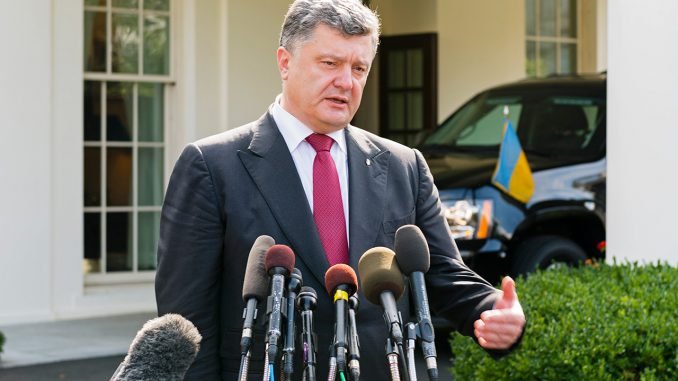
Addressing the joint meeting, President Poroshenko praised the United States for its steadfast support to Ukraine in assisting with financial and technical help. He pleaded for more assistance and political support, including military equipment, to assist in his government’s fight against the Russian-backed separatists.
“I urge America to help us rise and be equal to its natural and manifest role. I urge America to lead the way,” Poroshenko said. He asked the US joint meeting to give his nation more political support, as well as “military equipment”. Even though for his army “blankets and night-vision goggles are important”, Poroshenko stated, “One cannot win a war with blankets”.
President Poroshenko received several standing ovations, and he requested that the Congress “not let Ukraine stand alone in the face of this aggression”. He also demanded “special, non-allied partner status” for Ukraine. Poroshenko compared the situation in Ukraine to that in the Middle East. “Just like Israel, Ukraine has the right to defend her territory — and it will do so, with all the courage of her heart and dedication of her soul,” he said.
Wednesday morning, the White House had announced that further $53 million in aid would be coming to Ukraine. At the end of their meeting in the White House, Mr. Poroshenko stated that he had requested Mr. Obama to provide military assistance and had gotten word from the US president that he would evaluate this positively. The White House had announced the day before that no military assistance was forthcoming, but that together with the latest promises, the United States had provided over $200 million in aid to Ukraine this year.
During the meeting at the White House, a large crowd gathered to show their support for President Poroshenko and Ukraine. Among the many peaceful protestors was a large contingent of Lithuanian Americans and the Lithuanian Ambassador to the United States, Žygimantas Pavilionis. The protesters not only came out in support of Mr. Poroshenko, but also demanded the complete withdrawal of all Russian military forces from the Ukrainian territory.
Referring the agreement signed this week between Ukraine and the EU, Ambassador Pavilionis said: “The ratification of the Association Agreement is not the end, but just the beginning of most difficult but also most important implementation process.”
Žygimantas Pavilionis sees the step forward in joining the EU as they only way to get rid of what he calls the ‘Soviet cancer’ that keeps Ukraine under Putin’s KGB style control. “Any delay in implementing the agreement or attempting to achieve a balance between the West and the East will simply drag down the way forward.’’ Ambassador Pavilionis added, “Big power politics is returning to Europe – and that must be resisted for the sake of those heroes that sacrificed their lives for us.” Pavilionis sees the Maidan as a clear choice by the Ukrainian people to fight until the very end for the sake of a better Europe. Ambassador Pavilionis refers to that as his dream of a new Europe. “I call it the Maidan Europe, with Ukraine as an important part of that (new Europe), a moral centre,” he said.
In the hours following President’s Poroshenko’s speech, the Senate was taking up the Ukraine Freedom Support Act of 2014. Introduced by the Senate Chairman for foreign relations Robert Menendez and Senator Bob Corker, once passed, this legislation will target and impose broad sanctions on Russia’s defence, energy, and financial sectors, as well as increase military and non-military assistance for Ukraine. The legislation would require the president to apply sanctions against Gazprom if he determines that Gazprom is withholding significant natural gas supplies from member countries of NATO, including Lithuania, or further withholds such supplies from countries such as Ukraine, Georgia, or Moldova.
The bill designates Ukraine, Moldova, and Georgia as major non-NATO allies and authorizes measures to counter Russian propaganda in the former Soviet Union countries and prioritizes Russian-language broadcasting in Ukraine, Moldova, and Georgia.
Ukraine has gotten promises of a $17bn package from the IMF in May. However, this package is tied to painful economic reforms, especially given the fragile state of the Ukrainian economy. The actual contribution of the US has been relatively modest with an estimated $250m in largely technical assistance with reforms. Even the proposed Ukraine Freedom Support Act of 2014 would see direct US assistance support increase by modest $ 250 million in addition to contributions in sanctions levelled at Russia and assistance in countering Russian propaganda.
The EU has promised a significant package, including $2bn in loans and up to $10bn in reconstruction loans in addition to technical assistance to assist Ukraine in implementing much needed economic, state, and rule-of-law reforms needed to put it on the road to EU integration.

Be the first to comment